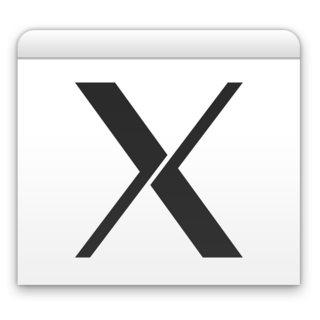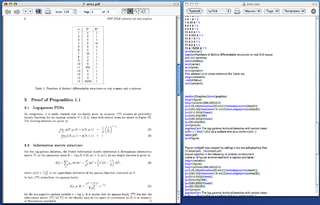Related Research Articles

LaTeX is a software system for typesetting documents. LaTeX markup describes the content and layout of the document, as opposed to the formatted text found in WYSIWYG word processors like Microsoft Word, LibreOffice Writer and Apple Pages. The writer uses markup tagging conventions to define the general structure of a document, to stylise text throughout a document, and to add citations and cross-references. A TeX distribution such as TeX Live or MiKTeX is used to produce an output file suitable for printing or digital distribution.
TeX, stylized within the system as TeX, is a typesetting system which was designed and written by computer scientist and Stanford University professor Donald Knuth and first released in 1978. TeX is a popular means of typesetting complex mathematical formulae; it has been noted as one of the most sophisticated digital typographical systems.

Ghostscript is a suite of software based on an interpreter for Adobe Systems' PostScript and Portable Document Format (PDF) page description languages. Its main purposes are the rasterization or rendering of such page description language files, for the display or printing of document pages, and the conversion between PostScript and PDF files.

The device independent file format (DVI) is the output file format of the TeX typesetting program, designed by David R. Fuchs and implemented by Donald E. Knuth in 1982. Unlike the TeX markup files used to generate them, DVI files are not intended to be human-readable; they consist of binary data describing the visual layout of a document in a manner not reliant on any specific image format, display hardware or printer. DVI files are typically used as input to a second program which translates DVI files to graphical data. For example, most TeX software packages include a program for previewing DVI files on a user's computer display; this program is a driver. Drivers are also used to convert from DVI to popular page description languages and for printing.

BibTeX is both a bibliographic flat-file database file format and a software program for processing these files to produce lists of references (citations). The BibTeX file format is a widely used standard with broad support by reference management software.

Portage is a package management system originally created for and used by Gentoo Linux and also by ChromeOS, Calculate, Sabayon, and Funtoo Linux among others. Portage is based on the concept of ports collections. Gentoo is sometimes referred to as a meta-distribution due to the extreme flexibility of Portage, which makes it operating-system-independent. The Gentoo/Alt project was concerned with using Portage to manage other operating systems, such as BSDs, macOS and Solaris. The most notable of these implementations is the Gentoo/FreeBSD project.

XQuartz is an open-source version of the X.Org X server, a display server for the X Window System that runs on macOS. It formally replaced Apple's internal X11 app. The name "XQuartz" derives from Quartz, part of the macOS Core Graphics framework, to which XQuartz connects these applications. XQuartz allows cross-platform applications using X11 for the GUI to run on macOS, many of which are not specifically designed for macOS. This includes numerous scientific and academic software projects.
MiKTeX is a free and open-source distribution of the TeX/LaTeX typesetting system for Microsoft Windows. It also contains a set of related programs. MiKTeX provides the tools necessary to prepare documents using the TeX/LaTeX markup language, as well as a simple TeX editor: TeXworks. The name comes from Christian Schenk's login: MiK for Micro-Kid.

TeXShop is a free LaTeX and TeX editor and previewer for macOS. It is licensed under the GNU GPL.

XeTeX is a TeX typesetting engine using Unicode and supporting modern font technologies such as OpenType, Graphite and Apple Advanced Typography (AAT). It was originally written by Jonathan Kew and is distributed under the X11 free software license.

There are Unicode typefaces which are open-source and designed to contain glyphs of all Unicode characters, or at least a broad selection of Unicode scripts. There are also numerous projects aimed at providing only a certain script, such as the Arabeyes Arabic font. The advantage of targeting only some scripts with a font was that certain Unicode characters should be rendered differently depending on which language they are used in, and that a font that only includes the characters a certain user needs will be much smaller in file size compared to one with many glyphs. Unicode fonts in modern formats such as OpenType can in theory cover multiple languages by including multiple glyphs per character, though very few actually cover more than one language's forms of the unified Han characters.

Lazarus is a free, cross-platform, integrated development environment (IDE) for rapid application development (RAD) using the Free Pascal compiler. Its goal is to provide an easy-to-use development environment for programmers developing with the Object Pascal language, which is as close as possible to Delphi.

Code::Blocks is a free, open-source, cross-platform IDE that supports multiple compilers including GCC, Clang and Visual C++. It is developed in C++ using wxWidgets as the GUI toolkit. Using a plugin architecture, its capabilities and features are defined by the provided plugins. Currently, Code::Blocks is oriented towards C, C++, and Fortran. It has a custom build system and optional Make support.

TeX Live is a cross-platform, free software distribution for the TeX typesetting system that includes major TeX-related programs, macro packages, and fonts. It is the replacement of its no-longer supported counterpart teTeX. It is now the default TeX distribution for several Linux distributions such as openSUSE, Fedora, Debian, Slackware, Ubuntu, Termux and Gentoo. Other Unix operating systems like OpenBSD, FreeBSD and NetBSD have also converted from teTeX to TeX Live.
The following tables compare notable reference management software. The comparison includes older applications that may no longer be supported, as well as actively-maintained software.

BibDesk is an open-source reference management software package for macOS, used to manage bibliographies and references when writing essays and articles. It can also be used to organize and maintain a library of documents in PDF format and other formats. It is primarily a BibTeX front-end for use with LaTeX, but also offers external bibliographic database connectivity for importing, a variety of means for exporting, and capability for linking to local documents and automatically filing local documents. It takes advantage of many macOS features such as AppleScript and Spotlight.
References
- 1 2 "MacTeX - TeX Users Group". tug.org. Retrieved 2019-07-22.
- ↑ "More Packages - MacTeX - TeX Users Group". www.tug.org. Retrieved 2019-07-22.